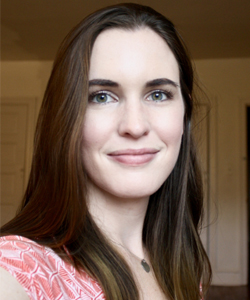
Hometown: Princeton, New Jersey
Undergraduate: University of Delaware (go hens!)
Can you tell me a little bit about yourself before you came to Drexel?
Prior to Drexel, I was a veterinary nurse for four years. Part of that time was as a radiation oncology veterinary nurse, working with an amazing oncologist who really valued instilling knowledge in her nurses as to why we did everything we did. That was how I became interested in cancer research, and she pushed me to pursue it. When I first entered college I had intended to go to medical school, and my interest in biology never left. Ultimately I landed at Drexel!
How did you discover your program?
Drexel was one of the few medical schools that had a specific cancer biology program, and it was nearby where I had lived my entire life. I also knew that Philadelphia was a great place to be for medical research, with lots of collaboration and resources at your disposal, so it was very appealing to me. Once I found my program, I just knew it was a great fit for me.
What was your relationship with the faculty like?
I had a really great relationship with the faculty — not only were they always accommodating and willing to answer questions, but they genuinely care about the success of their students. I had the privilege to do my first lab rotation at the Wistar Institute, and even there I was warmly welcomed and given every opportunity I could grasp. I’m a very independent scientist, and faculty were always able to guide me while accommodating my desire to really spearhead my own project. It was a very personalized experience.
How about the relationship with your classmates?
My classmates were truly a big reason I was successful at Drexel — we became a team and really helped each other succeed, not only in collaborative research but academically as well. We were often able to fill in each other’s gaps. Students in the years above me were also a great resource, in both the lab and the classroom.
Can you tell me about the research that you did while at Drexel?
In my first lab rotation, I worked with small molecule HSP70 inhibitors in melanoma in the lab of Dr. Maureen Murphy at the Wistar Institute. For my main thesis project in the Department of Biochemistry & Molecular Biology at Drexel, I worked in Dr. Mauricio Reginato’s lab on a metabolic pathway in glioblastoma, and the importance of a particular kinase within it. I had a hand not only in the traditional tissue culture-based in vitro research, but also in establishing a novel mouse model for studying brain cancer. I was very fortunate to be an author on three different publications during my time at Drexel.
Were you involved with any extracurricular activities?
Although most of my time was taken up studying and in the lab, I did get to participate in hosting some of our department’s lab happy hours! Outside of the lab on weekends I did a lot of hiking at the Wissahickon with my dog and loved to bring in baked goodies to share with the lab.
How did these support your academic journey?
When under such stressful conditions as you experience in graduate school, it’s incredibly important to learn to balance your life — having outside activities really gave me a reason to look up from my lab bench and my notes and have time to clear my head. Having things to focus on besides science keeps your mind more at ease, which ultimately helps keep you more balanced and focused when it matters.
What have you been doing since you graduated?
Since graduating from Drexel, I worked for two years at a small biotech company in Cambridge, Massachusetts, called Vor Biopharma. While there, I worked on development of CAR-T therapies for acute myeloid leukemia as a companion therapeutic to Vor’s primary platform, engineered stem cells for bone marrow transplant. I recently moved out to the Bay Area in California for a new position at Bristol Myers Squibb, doing some foundational work for a new T cell platform in their cancer biology tumor microenvironment department.
What advice would you give to a future student?
Career advice: Seize every opportunity you can! You never know when you’ll find your niche. At the same time, make time for yourself or you will burn out. My best academic advice: Don’t let yourself fall behind. The amount of work can be overwhelming at times, so make sure you keep up with things as they come at you. Everyone has weak points, but as long as you can acknowledge yours, you will find a way to overcome them. And finally, my best science advice, which came from the post-doc I worked with in my first lab: Your project is your baby, and it is your job and your job alone to make sure it succeeds. It is critical to take the initiative, find the resources and push things forward. Science can be unpredictable, but negative results are still results! Keep pushing forward and you will have a rewarding, successful career in science.